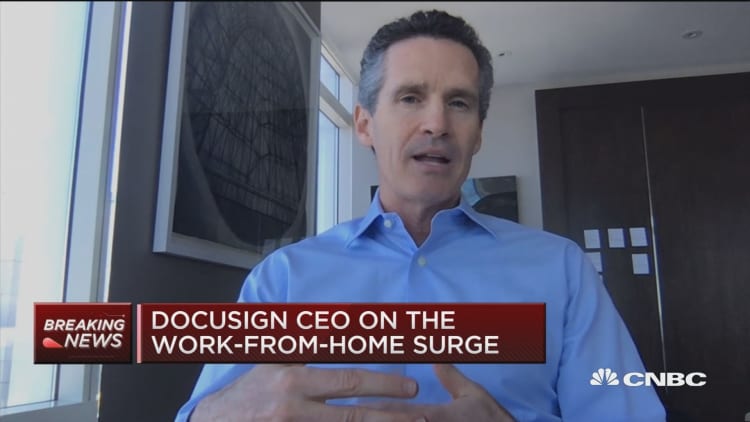DocuSign CEO says the company has not yet seen a slowdown in activity among real estate clients
- DocuSign CEO Dan Springer said Tuesday the company has not noticed a decline in activity among its clients in the real estate industry despite the economic shock from the coronavirus.
- “While a lot of people are concerned there is going to be a slowdown, we haven’t yet seen that at DocuSign,” Springer told CNBC.
- DocuSign has experienced challenges among its clients in the travel and hospitality sector, Springer said.

DocuSign CEO Dan Springer said Tuesday the company has not noticed a decline in activity among its clients in the real estate industry despite the economic shock from the coronavirus.
“Real estate is an interesting one because while a lot of people are concerned there is going to be a slowdown, we haven’t yet seen that at DocuSign,” Springer said on CNBC’s “Fast Money.”
Stay-at-home orders across the U.S., as well as the general economic uncertainty brought the COVID-19 outbreak, has made real estate a vulnerable sector. Real estate sales in New York City, for example, experienced a steep decline toward the end of March.
DocuSign, an electronic agreement manager, has created some programs for some smaller Realtors to “give them attractive pricing in coordination with the National Association of Realtors,” Springer said.
Springer said other recent trends among DocuSign’s clients may be less surprising. DocuSign has seen challenges among clients in the travel and hospitality sectors, Springer said.
“We see a lot of those customers saying, ‘We really see that we’re going to be having a future headwind,’ and they’re probably going to be less aggressive growers in the near term,” he said.
On the contrary, DocuSign has seen “particular strength” among customers in the financial services, health care and life sciences industries, according to Springer.
“A lot of government agencies are doing more,” Springer added. “That includes things like Atlanta, California, up to federal so kind of all three levels.”
Many on Wall Street have looked at DocuSign as a stock stands to benefit from the sharp rise in work-from-home policies implemented in response to the coronavirus.
DocuSign is up 18.7% so far this year while the S&P 500 is down 17.7% over that same period. While a number of stocks have been setting fresh 52-week lows in recent weeks, DocuSign hit an all-time intraday high of $98.38 on March 31.
Shares of San Francisco-based DocuSign closed down 2.4% on Tuesday to $87.97 each.
While Springer said the advent of widespread work-from-home policies is generally good for companies like DocuSign, he noted the company is not immune to the broader macroeconomic uncertainty.
That said, DocuSign has seen an overall uptick from its existing clients, according to Springer.
“We have almost 600,000 customers, from the smallest businesses up to the largest Fortune companies, and we’ve seen across that that there is more demand for volumes,” he said.
DocuSign’s software that goes beyond just electronic signatures and helps businesses create and manage agreements “is leading to another set of growth drivers for us,” Springer added.
